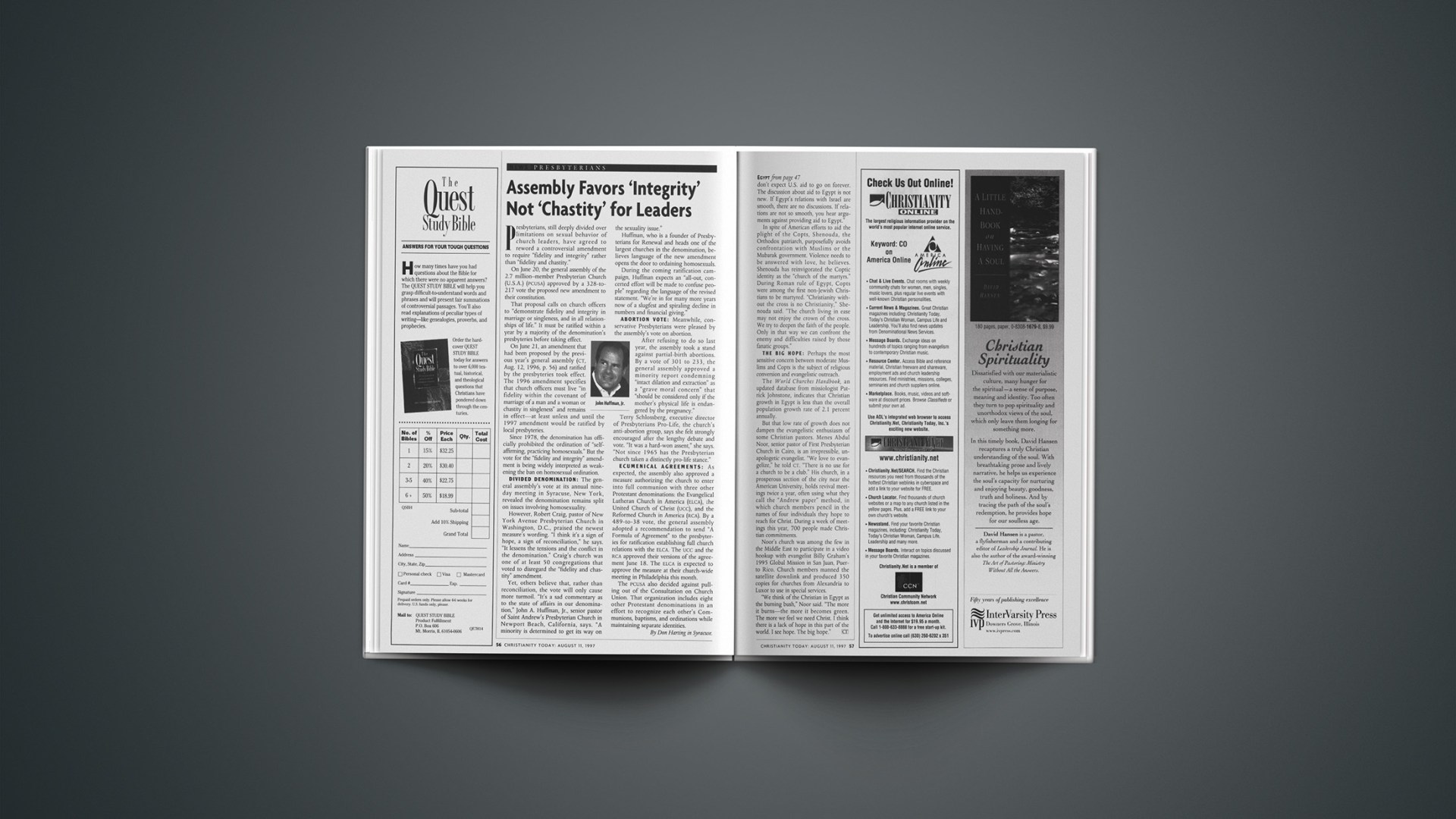Presbyterians, still deeply divided over limitations on sexual behavior of church leaders, have agreed to reword a controversial amendment to require “fidelity and integrity” rather than “fidelity and chastity.”
On June 20, the general assembly of the 2.7 million-member Presbyterian Church (U.S.A.) (PCUSA) approved by a 328-to-217 vote the proposed new amendment to their constitution.
That proposal calls on church officers to “demonstrate fidelity and integrity in marriage or singleness, and in all relationships of life.” It must be ratified within a year by a majority of the denomination’s presbyteries before taking effect.
On June 21, an amendment that had been proposed by the previous year’s general assembly (CT, Aug. 12, 1996, p. 56) and ratified by the presbyteries took effect. The 1996 amendment specifies that church officers must live “in fidelity within the covenant of marriage of a man and a woman or chastity in singleness” and remains in effect—at least unless and until the 1997 amendment would be ratified by local presbyteries.
Since 1978, the denomination has officially prohibited the ordination of “self-affirming, practicing homosexuals.” But the vote for the “fidelity and integrity” amendment is being widely interpreted as weakening the ban on homosexual ordination.
DIVIDED DENOMINATION: The general assembly’s vote at its annual nine-day meeting in Syracuse, New York, revealed the denomination remains split on issues involving homosexuality.
However, Robert Craig, pastor of New York Avenue Presbyterian Church in Washington, D.C., praised the newest measure’s wording. “I think it’s a sign of hope, a sign of reconciliation,” he says. “It lessens the tensions and the conflict in the denomination.” Craig’s church was one of at least 50 congregations that voted to disregard the “fidelity and chastity” amendment.
Yet, others believe that, rather than reconciliation, the vote will only cause more turmoil. “It’s a sad commentary as to the state of affairs in our denomination,” John A. Huffman, Jr., senior pastor of Saint Andrew’s Presbyterian Church in Newport Beach, California, says. “A minority is determined to get its way on the sexuality issue.”
Huffman, who is a founder of Presbyterians for Renewal and heads one of the largest churches in the denomination, believes language of the new amendment opens the door to ordaining homosexuals.
During the coming ratification campaign, Huffman expects an “all-out, concerted effort will be made to confuse people” regarding the language of the revised statement. “We’re in for many more years now of a slugfest and spiraling decline in numbers and financial giving.”
ABORTION VOTE: Meanwhile, conservative Presbyterians were pleased by the assembly’s vote on abortion.
After refusing to do so last year, the assembly took a stand against partial-birth abortions. By a vote of 301 to 233, the general assembly approved a minority report condemning “intact dilation and extraction” as a “grave moral concern” that “should be considered only if the mother’s physical life is endangered by the pregnancy.”
Terry Schlossberg, executive director of Presbyterians Pro-Life, the church’s anti-abortion group, says she felt strongly encouraged after the lengthy debate and vote. “It was a hard-won assent,” she says. “Not since 1965 has the Presbyterian church taken a distinctly pro-life stance.”
ECUMENICAL AGREEMENTS: As expected, the assembly also approved a measure authorizing the church to enter into full communion with three other Protestant denominations: the Evangelical Lutheran Church in America (ELCA), the United Church of Christ (UCC), and the Reformed Church in America (RCA). By a 489-to-38 vote, the general assembly adopted a recommendation to send “A Formula of Agreement” to the presbyteries for ratification establishing full church relations with the ELCA. The UCC and the RCA approved their versions of the agreement June 18. The ELCA is expected to approve the measure at their church-wide meeting in Philadelphia this month.
The PCUSA also decided against pulling out of the Consultation on Church Union. That organization includes eight other Protestant denominations in an effort to recognize each other’s Communions, baptisms, and ordinations while maintaining separate identities.
Copyright © 1997 Christianity Today. Click for reprint information.










